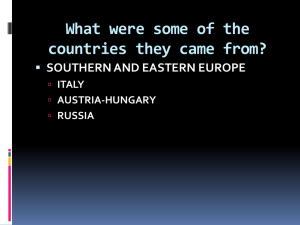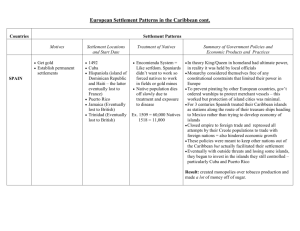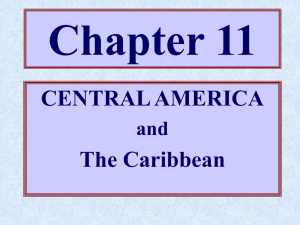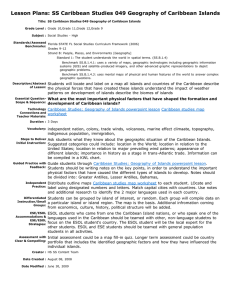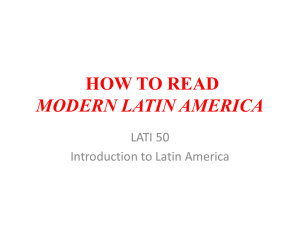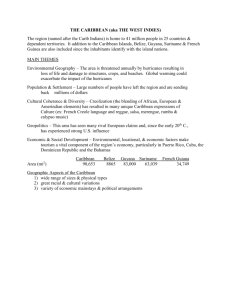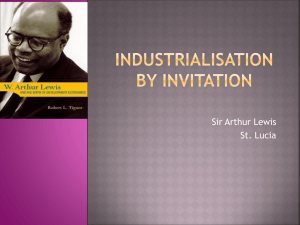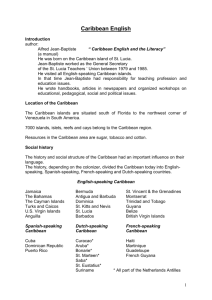Isthmus
advertisement
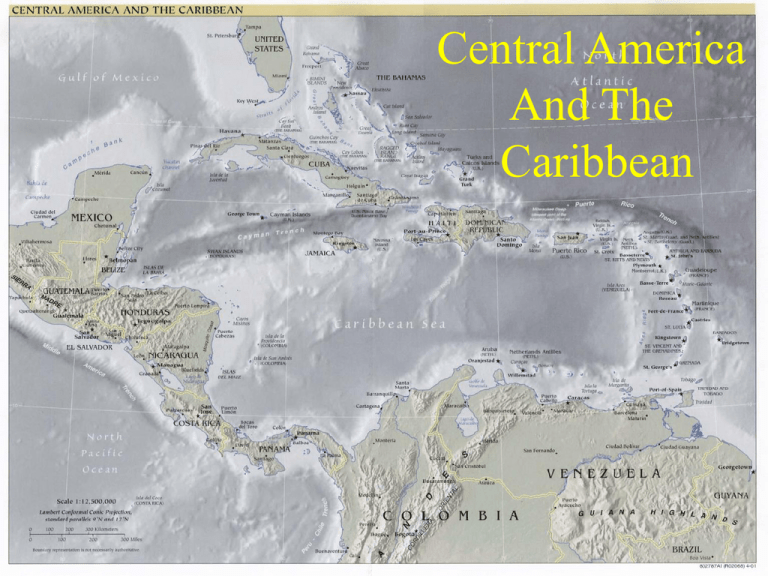
Central America And The Caribbean Central America Isthmus – A narrow strip of land, with water on both sides, that connects two larger bodies of land Central America’s Geography Three major landforms in Central America 1. Mountainous Core • • Mountains run down the center of the area Two climate zones in the core 1. 2. Spring like year round temperatures (3,000 to 6,000 feet of elevation) Cold climates above that 2. Caribbean lowlands • • Eastern side of Central America Tropical Wet climate 3. Pacific Coastal Plains • • West side of Central America Savanna Climate with grassland vegetation Caribbean Islands Three groups of Islands in the Caribbean 1. Lesser Antilles • • Volcanic Islands Smaller islands in the southeastern part of the Caribbean (Map) 2. Greater Antilles • • Also Volcanic Islands Larger Islands such as Cuba, Jamaica, Haiti and Dominican Republic (Map) 3. Bahamas • • Coral Islands Made from the remains of dead sea animals (Map) People of Central America • Indians – Mayan empire spread throughout this area – Largest number live in Guatemala • Europeans and Mestizos – Largest European settlement today is in Costa Rica – Mestizos mostly live in El Salvador and Nicaragua • African Descent – Came over to work on the banana plantations and build the Panama Canal People of the Caribbean • Colonialism – Europeans came to profit from the sugar trade – They brought Africans to be slaves • Mixture of races – – – – Natives Africans Europeans (French, British, Danish and Dutch) Mestizos Culture of Central America and the Caribbean • Central American Culture – Mostly Spanish speaking – Roman Catholic – Most cultural traits are a result of Spanish Colonialism • Caribbean Culture – Culture is based on the Colonizing country – Large African influence as a result of the slave trade Where do they live? • Caribbean – Caribbean islands are crowded – Most live in cities • Central America – Most are Farmers – Live in rural areas Economy • Tourism • Agriculture – Sugar – Fruit • Informal economy – Street vendors, shoe shiners and many more – Drug trafficking • Levels of Society – Small group of wealthy (mostly descendents of Europeans) – Small middle class – Large lower class Political Unrest In Central America • Causes – Shortage of available farmland – Unequal distribution of wealth – Government mainly serves the interest of the wealthy • Nicaragua – Contras Fighting against the Sandinista government that favored the wealthy – In 1990 a new president was elected for the first time. Political Unrest In Central America • El Salvador – Wealthy land owners hired death squads to eliminate their political opponents – 1992 a peace agreement lead by the UN ended the war • Guatemala – In 1960 a civil war erupted against the militarily backed dictator – After the war the military was still a powerful force in the government – In 1993 Ramiro de Leon Carpio was elected by their congress and is a respected leader Political Unrest In The Caribbean • Cuba – 1959 Fidel Castro lead a successful military revolution – He has Ruled ever since (I think he is a hundred) • Haiti – 1994 the people overthrew the military dictator with the help of the U.S. – Haiti now has a democracy The End
